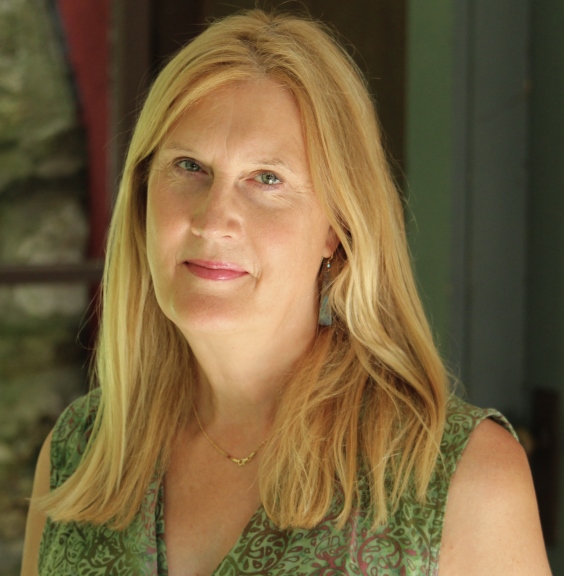
The most dispiriting moment in Jenny Boylan’s book is when she realizes that talking like a girl means sounding uncertain about your own name, like this: “Hello? I’m Jenny Boylan?”
The funniest moment is when her doctor tells her that gay men and lesbians don’t really have much in common with transsexuals. “Yeah,” Boylan replies, “except for the fact that we get beaten up by the same people.”
And one of the most telling moments in the book is when she goes to the credit union to have the name on her account changed from James Finney Boylan to Jennifer Finney Boylan. “You were named James?” the manager asks.
“I used to be a boy. Now I’m female. I had my name changed,” Boylan tells the manager.
“Huh,” she replies. “Okay, well this is simple enough. We’ll just change your name in the data field here.”

Jennifer Finney Boylan
Boylan’s new book, “She’s Not There,” is a very funny memoir of growing up confused and a very smart consideration of what it means to be a woman. (Yeah, hormones make a difference.) It’s also the story of a writer and college professor who winds up married, living in Maine with two kids, all the while knowing that his true gender doesn’t match his body. It’s about becoming who you really are, which in this case meant becoming a woman.
But it is also about how good people can be. Because Boylan’s book is not about being shunned by her colleagues, losing her job, having her family ditch her. A good bit of it is merely about changing the data field. Even the woman who married Jim and wound up with Jenny responded with love, leavened with anger and pain, too. (“I want what I had,” she says at one point.) Boylan’s sons decided to call her “Maddy,” merging the titles of Mommy and Daddy. Her students still loved her—”damn, girl, you look good!” one writes—and her colleagues rolled with it, the professors at Colby and the musicians with whom she plays in a bar band. (Although her friend Curly was chagrined when he asked what it was like to have breasts and she responded that the world doesn’t revolve around breasts. “I wish you could hear yourself,” he sighed sadly.) “As far as I’m concerned, you’re you, no matter what,” one friend said.
Tolerance is the rice pudding of modern behavior; it tastes sweeter than bigotry, but no one would confuse it with a parfait.
What Boylan’s book represents is something deeper and more important than tolerance. The way in which people insisted on valuing her on the basis of who she was and not their confusion about what she had done represents the best of human behavior.
Doing that is hard. The old bright lines used to make things so simple. White was different from black. Male was different from female. Straight was better than gay. Gay was bad. So was sex, unless it had been sanctified by Alencon lace and a catering hall. Sanctified by God, some would say, or “natural moral law,” which is what the Vatican cited in its statement last week against gay marriage, the theological version of “because I said so.”
The God who suggested we love one another seemed strangely absent from all this. Look at the bright lines in the new movie “The Magdalene Sisters.” It’s a devastating drama based on the true story of unmarried Roman Catholic girls who got pregnant and were essentially imprisoned in Irish laundries called the Magdalene Asylums, sent there by their own parents for no crime other than sexuality. Who cares about compassion when you can have never-darken-my-doorstep certainty?
In his afterword to Boylan’s book, her best friend, the writer Richard Russo, refers to a line in “The Great Gatsby”: he says his first reaction was to want “the world to be ‘uniform and at a sort of moral attention’.” That’s natural when the unexpected barrels around the corner. But for many years that feeling was the bedrock of a morality that was essentially immoral because it reduced human interaction to mathematics, without understanding or empathy. To have learned to think “you’re you, no matter what” about those we love and even those we don’t know has alleviated an enormous amount of unnecessary pain.
As for Jenny, she’s now the woman outside that she always felt she was within. The same salesman who tried to sell Jim a car and focused on the spark plugs tried to sell her one for $1,000 more and talked about the cup holders. She started ordering diet soda and salads, a cave to cultural stereotypes that made her nuts. She was cool about the demands her situation made on others: “If you’ve read this far in this note, it’s quite possible that you feel that the top of your head is about to blow off,” she wrote in a letter to colleagues explaining it all.
One night at dinner her mother raised her glass and said, “I am so proud of my beautiful daughter.” Maybe there are those who feel she should disapprove, or hide it from her friends, or cut off contact with her own kid. After all, that’s what people did in the old days, to a pregnant daughter, to a gay son, to anyone outside the bright lines. But that’s just wrong.
Photo of rainbow © virtosmedia, 123RF Free Images.
Photo of Jennifer Finney Boylan by Dan Haar/Celadon Books/Macmillan.
For more on Jennifer Finney Boylan, visit her official website.